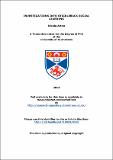Investigations into stickleback social learning
Abstract
The objective of the experiments contained within this thesis was to provide further
insight into the social learning capabilities of threespined sticklebacks and the factors affecting the transmission of information through populations.
There are a number of previous studies which provide evidence that both threespined
and ninespined sticklebacks possess the ability to learn socially under a range of
contexts, such as foraging, anti-predator behaviour, mate choice, and cooperation. The
studies presented in this thesis aim to extend this knowledge and shed light on the social learning processes used. Evidence was found to support previous opinion that threespined sticklebacks are capable of using a number of social learning processes, including local enhancement, stimulus enhancement, and the social enhancement of food preferences. However, therewas no evidence to suggest that either threespined or ninespined sticklebacks are capable of using the social learning process of delayed local enhancement under a shelter choice context, a process which both species have previously been shown to use under a foraging context. This thesis also explores the effect of the social network within shoals of threespined sticklebacks upon the transmission of novel foraging information. It was discovered that both prior association preferences and prior diet have an effect on the order in which individuals discover a novel foraging task.
Type
Thesis, PhD Doctor of Philosophy
Collections
Items in the St Andrews Research Repository are protected by copyright, with all rights reserved, unless otherwise indicated.

